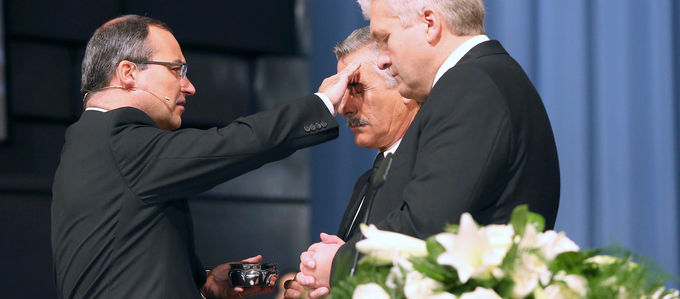
For whom did Jesus Christ die? For us? For many? Or for all? This question has resulted in a small but significant change in the consecration formula for Holy Communion. The answer has been well researched.
You have to be looking quite closely to even discover the difference ushered in by the liturgy reform of 2011: according to the new consecration formula, the blood of Christ has no longer been shed “for you”, but “for many”.
Evidence for all the possibilities
How does all of this fit together with the fundamental truth of the gospel that “one died for all”, as the second epistle to the Corinthians, for example, puts it? Mind you, the words “for many” are absolutely biblical as well: this is the literal translation of the Greek words hypér pollôn as found in the accounts of the Last Supper according to Mark and Matthew. There they are found next to the words “for you”.
Church Fathers and teachers from Origen to Thomas Aquinas have racked their brains over this, but with no clear result. Nevertheless, the words “for many” were often heard in the consecration formulas of the Catholic, Orthodox, and Anglican Churches for centuries. Only the Protestants limited themselves to the expression: “for you”.
The pros and cons
Of all people, it was a Protestant scholar who threw the Catholic liturgy overboard at this point. His contribution to an internationally renowned lexicon under the heading “polloi” was so powerful that the Second Vatican Council released the national language translations in 1968. Since that time, the Catholic formula began using the words “for all” in many places.
In 2006, barely 40 years later, the Vatican sought to return to the expression “for many”. It was at that time that scholars began discussing the question back and forth, and so it was that the “pro multis controversy”—named for the Latin translation of the Greek hypér pollôn—was born. And it was precisely during this phase that the New Apostolic liturgy changed the words of its consecration formula from “for you” to “for many”.
Spoken for whom?
This much is now clear: the argumentation of the aforementioned lexicon article has been severely scuffed, if not disproven altogether. This is because the author resorted to a hypothetical reverse translation into Aramaic—a method that is too speculative for today’s scholars.
Scholars are in agreement at least on this point: whether the liturgy says “for you”, “for many”, or “for all” is less a biblical or linguistic question than a theological question of liturgy craft. The relevant questions here are: to whom is the invitation to celebrate the sacrament addressed? And in what context is it spoken?
“Jesus came for all human beings, but not all of them accept Him,” says the Catechism of the New Apostolic Church. It goes on to say: “In order to obtain forgiveness of sins and be snatched from spiritual death, the first prerequisite is the sinner’s belief in Jesus Christ as the Redeemer.” And last but not least it is also true that “the fundamental prerequisites for partaking worthily of Holy Communion are belief and a repentant heart filled with longing for salvation”.
Photo: kavardakova – stock.adobe.com














